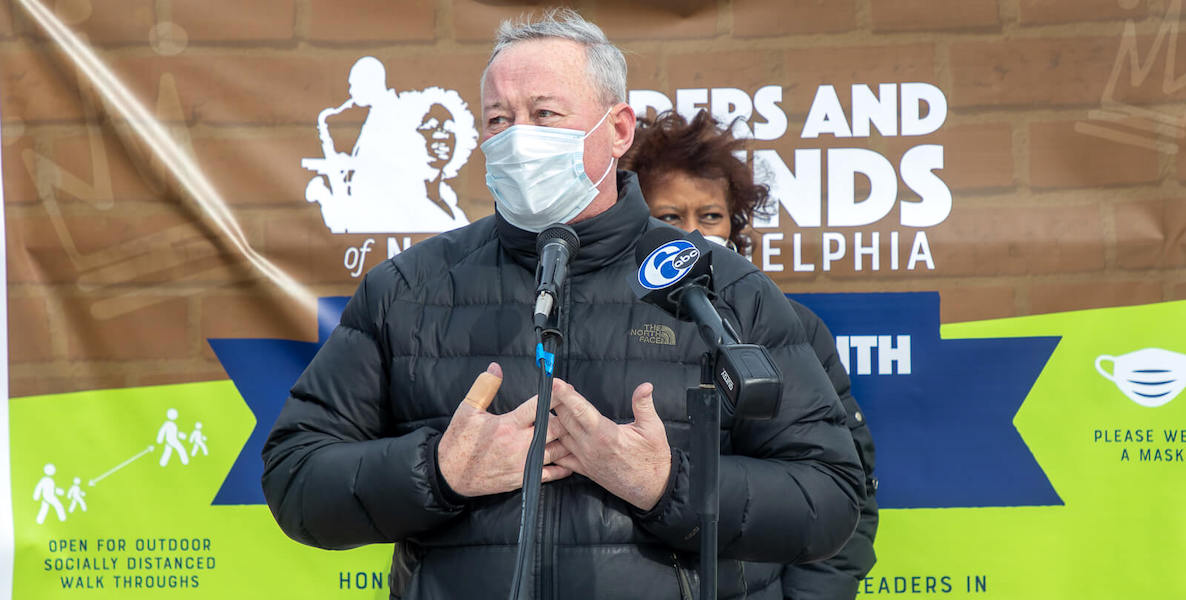First, the good news. In case you missed it, Philadelphia stands to receive about $1.4 billion from the $1.9 trillion coronavirus relief bill passed earlier this month. That’s in addition to an anticipated $1.3 billion for Philadelphia’s schools.
It’s a much-needed infusion of resources in a town that was strapped even before the pandemic. But we’d better anticipate the bad news, in order to stave it off: If we just keep doing as we’ve been doing — if we don’t take this opportunity to rethink not just what we spend, but how we operationalize — we’re in grave danger of wasting another financial windfall.
Mayor Jim Kenney’s first term alone added $1 billion to the city’s coffers. After that influx of indiscriminate spending, we have a significantly higher murder rate, higher taxes, the same anemic job growth, and roughly the same worst-in-the-nation poverty rate.
I say “another” because we’ve seen this movie before, folks. Hell, Mayor Jim Kenney’s tax-happy first term alone added $1 billion to the city’s coffers. How’d that work out for us? After that influx of indiscriminate spending, we have a significantly higher murder rate, higher taxes, the same anemic job growth (the jobs we have produced have been the wrong kind), and roughly the same worst-in-the-nation poverty rate. What are the chances that a government that couldn’t find $33 million in its own unreconciled bank accounts, that embarrassingly outsourced its vaccination rollout to a bunch of college bros, that continues to “courtesy tow” its citizens’ legally-parked cars—will oversee a smart return on this latest investment?
A politics driven more and more by ideological shibboleth and Twitter sloganeering is directly related to spending that doesn’t move the needle on long-intractable problems. So how do we get to practical problem-solving? The late civic champion (and Citizen founding chairman) Jeremy Nowak prescribed the first step: Recognizing that “policy is implementation.”
RELATED FROM THE CITIZEN
Bruce Katz on how cities should use the new Covid relief funds to bring efficient and equitable change to communities
If you can’t make government work for its citizens, if inefficiency and untrustworthiness define City Hall’s brand, then the issue before us ain’t solely about how much money we have to spend. It’s also about how we perform the blocking and tackling of delivering return to the city’s stakeholders — its citizens.
This, then, is a unique opportunity. In order to help ensure that our $1.4 billion from the feds doesn’t follow the same-old, same-old script and get sprinkled around to different interest groups without regard to making lasting inroads on big problems, here are three implementation ideas for Mayor Kenney.
First, Let’s Finally Get Our Fiscal House In-Order. It’s been commonly accepted that the city has a $450 million hole that needs to be filled before any of the $1.4 billion can be spent, effectively cutting our windfall by close to a third. But that presumes that the 2019 and (disrupted) 2020 budgets were as air-tight as could be. What are the chances of that?
A few weeks ago, you’ll recall, former Mayor Ed Rendell walked me through how, in his first term, he cut $250 million out of a much smaller city budget and increased efficiency and governmental customer service. “There are so many common sense reforms that add up to real money in the budget, but no one has bothered to look for them in decades,” he said.
RELATED FROM THE CITIZEN
Mayor Kenney announced a $450 million budget shortfall. How much of that, Philly 3.0’s engagement director wonders, could the City make up by selling its vacant land?
Well, Jim Kenney promised to do just that when he ran in 2015 on a pledge to institute zero-based budgeting. Effectively, it would have mandated each city department to define its mission and, rather than ask for a percentage increase come budget time, start its annual budget process at zero — and build from there. In places like Montgomery County under then-Commissioner Josh Shapiro, it was a way of revealing and removing decades of political claims that had found their way into the budgetary crevices of local government.
Mayor Kenney will be presenting his budget to City Council on April 15. Will it be thrown together in the same way as past budgets, with layers of inefficiency and waste long baked-in? Or will it rethink the $450 million “hole” so government will be leaner and more efficient, while allowing for even more of the $1.4 billion to be invested?
Second, Appoint a Stimulus Czar. That’s what, at the federal level, Joe Biden did when he appointed former Clinton and Obama economic advisor Gene Sperling as the overseer of the implementation of his administration’s $1.9 trillion Covid relief plan.
There should be a credible, public-facing, appointed official doing the same locally. Someone empowered to hold the wheels of government accountable, yes, but also someone we can hold accountable. Someone who publicly reports — complete with goals, timetables, charts and graphs — where relief aid is going and what it is expected to accomplish.
I will even nominate a candidate for such a position, thereby no doubt dooming his chances. Ed DeSeve is not only a longtime Philadelphian, but also a legend who kind of invented the very notion of municipal finance.
DeSeve was the city’s finance director under Mayor Bill Green and went on to found Public Financial Management, the company that is the gold standard for municipal finance. (It was PFM that authored Ed Rendell’s fiscal plan that brought the city back from the brink of bankruptcy in the early 90s). DeSeve has been the CFO of HUD and the Deputy Director for Management at OMB under President Clinton, and — get this — he was Special Advisor to the President for Recovery Implementation back when Barack Obama passed his $787 billion Recovery Act after the Great Recession. It was DeSeve who oversaw its rollout and implementation. An outside audit astonishingly did not have a single critical finding against DeSeve’s Recovery Act implementation—no fraud, waste or bureaucratic hiccups. There may be no better authority on how to turn policy into real results in real people’s lives than DeSeve, who is currently a visiting fellow at the IBM Center for The Business of Government.
Third, Ask for Help. As Nowak and his co-author Bruce Katz, director of Drexel’s Nowak Metro Finance Center, always remind us, cities are run by networks, not governments. In some cities, though, sectors outside of City Hall are reticent about stepping up—or haven’t been challenged to do so.
That’s long been the case here, where the business and nonprofit classes have often been quick to privately complain but slow to publicly engage. That may be starting to change.
This week, The Chamber of Commerce held a news conference with Mayor Kenney and Commerce Director Michael Rashid to announce Ready.Set.Philly!, a $1.5 million campaign to start getting workers, shoppers and tourists back to the city’s central business districts.
This is a good, albeit tentative, first step. The Chamber has become more active of late, under the leadership of folks like Sue Jacobson, Jerry Sweeney, Bill Hankowsky and labor leader Ryan Boyer, who were all instrumental in the Ready.Set.Philly! program. But the Chamber is a trade association; while it should be lauded for stepping up, the chances are slim that it will remake itself into an agent of vast change. Its core mission, after all, is not to lessen the economic divide.
Just imagine how forward-thinking Philly would be if Mayor Kenney did three groundbreaking things: Smartly take a scalpel to the city budget; appoint a stimulus czar; and invite an army of the city’s best and brightest to embed with his government and lend their expertise to turning our relief act windfall into something transformational.
Then again, at times of crises, sometimes it’s surprising who shows up as civic first responders. Back in the 1970s, when New York was literally collapsing and President Gerald Ford refused to bail it out (prompting the Ford to City: Drop Dead New York Daily News headline), a bunch of wealthy New York business and civic leaders stepped up to prepay $600 million in taxes so the city could avoid bankruptcy.
 Do these times call for a type of local patriotism along those lines? I’ve been encouraged to hear about a group of civic and business leaders that has been meeting and trying to drive cross-sectional collaboration, perhaps ultimately taking a page from Pittsburgh’s Allegheny Conference, a vast array of stakeholders that have collaborated on producing a 10-year vision for their region.
Do these times call for a type of local patriotism along those lines? I’ve been encouraged to hear about a group of civic and business leaders that has been meeting and trying to drive cross-sectional collaboration, perhaps ultimately taking a page from Pittsburgh’s Allegheny Conference, a vast array of stakeholders that have collaborated on producing a 10-year vision for their region.
Admittedly, Philly’s private sector doesn’t have the wherewithal to do as David Rockefeller and other New York masters of the universe did in the 70s. Our business and civic community is already tightly squeezed. We’ve been playing the redistribution game for so long that there’s hardly anything left to redistribute.
But certainly there is more that stakeholders can do that aligns with their own enlightened self-interest, especially when it comes to helping city government implement recovery funds in a competent and equitable way. The Mayor could ask business and civic leaders to form a Civic Consulting Alliance, as has been done in Chicago. There — another corrupt, sclerotic government — civic and business leaders came together at the behest of the late groundbreaking Mayor Harold Washington nearly 35 years ago to, rather than just complain or retreat inward, bring pro bono management expertise to city government.
Today, Chicago’s Civic Consulting Alliance dispatches nonprofit and business leaders to work with local government, infusing the bureaucracy with visionary planning and implementation experience. It delivers $15 million in pro bono services a year to local clients, which include the Mayor, the Cook County President, and the Cook County Health and Hospitals System CEO. “Together, we develop and execute projects that leverage public sector vision and private sector expertise to solve our region’s biggest problems,” the CCA proclaims.
RELATED FROM THE CITIZEN
In Chicago, pro-bono civic leaders help implement smart policy
Just imagine how forward-thinking Philly would be if Mayor Kenney did those three groundbreaking things: Smartly take a scalpel to the city budget; appoint a stimulus czar to make sure our relief funds go where we want them to go; and invite an army of the city’s best and brightest to embed with his government and lend their expertise to turning our relief act windfall into something transformational.
If we manage all of this right, the days of wasting $1 billion here and $1 billion there—soon, to quote Sen. Everett Dirksen, it all adds up to real money—could become a footnote of our past.
The Citizen is one of 20 news organizations producing Broke in Philly, a collaborative reporting project on solutions to poverty and the city’s push towards economic justice. Follow the project on Twitter @BrokeInPhilly.
Header photo by Albert Lee / City of Philadelphia



